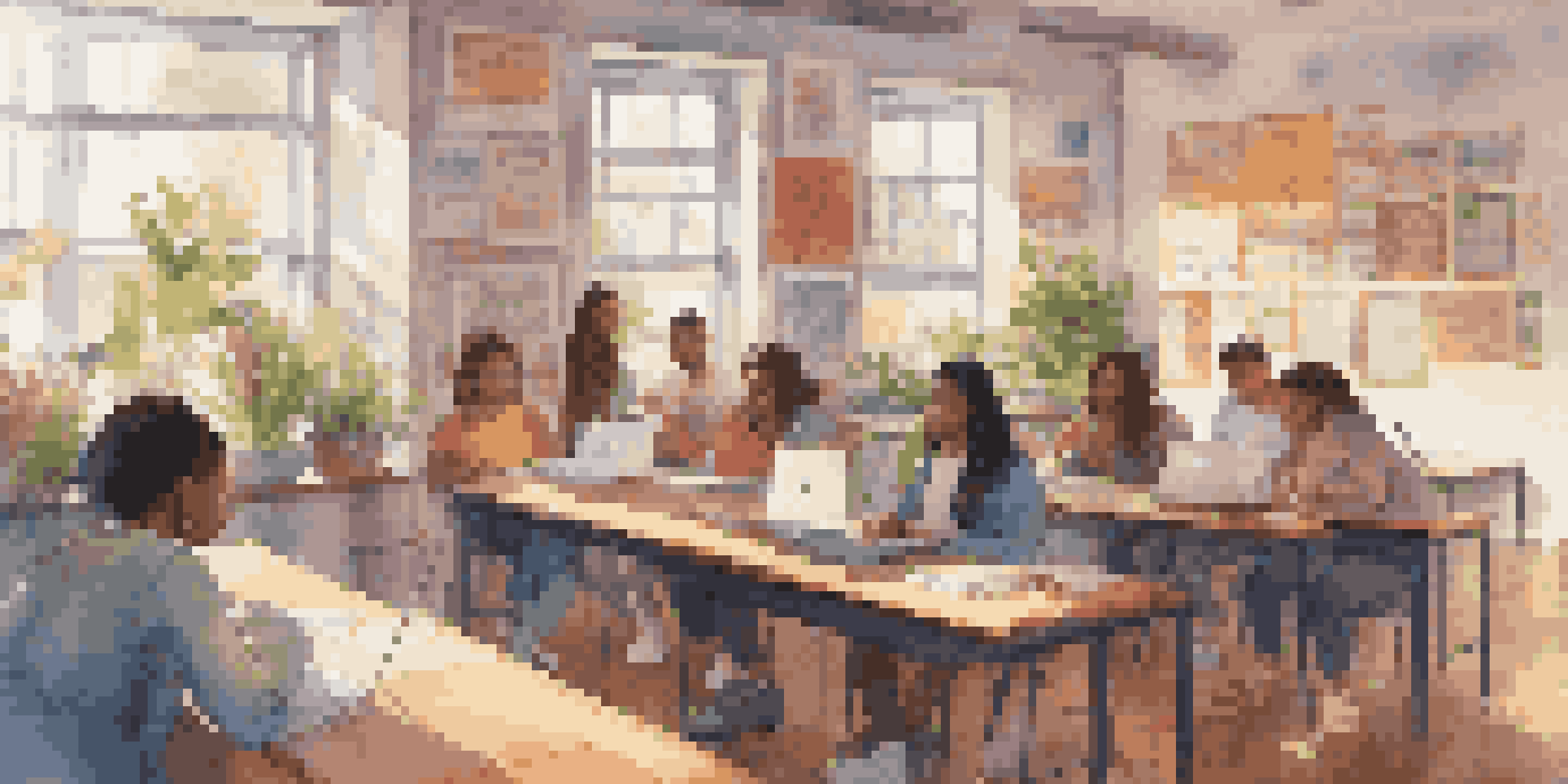Using Online Quizzes to Assess Music Knowledge and Skills

The Rising Popularity of Online Quizzes in Music Education
In recent years, online quizzes have gained traction as a tool for music education. They provide a flexible and interactive way to assess knowledge and skills, making learning more engaging for students. With the rise of digital platforms, educators are finding new ways to incorporate quizzes into their teaching strategies, enhancing the overall learning experience.
Education is the most powerful weapon which you can use to change the world.
The convenience of online quizzes allows students to learn at their own pace, fitting study time into their busy schedules. This adaptability not only caters to different learning styles but also helps in reinforcing concepts through repetition. As a result, students are more likely to retain information and apply their knowledge effectively.
Moreover, the instant feedback provided by online quizzes can be incredibly beneficial. Students can quickly identify areas where they excel and where they might need improvement, making the learning process more targeted and efficient. This immediate insight helps to motivate learners and encourages continuous progress.
Designing Effective Music Knowledge Quizzes
Creating a quiz that accurately assesses music knowledge involves thoughtful design and structure. It's essential to cover a range of topics, including music theory, history, and practical skills, to provide a comprehensive evaluation. By incorporating different question types, such as multiple-choice, true/false, and short answer, you can cater to various learning preferences.

Additionally, using multimedia elements can enhance the quiz experience. For instance, including audio clips of musical pieces or video snippets can help assess a student’s ability to analyze and identify different styles and instruments. This approach not only makes the quiz more engaging but also mirrors real-world musical scenarios.
Engaging Learning Through Quizzes
Online quizzes enhance music education by providing interactive assessments that cater to various learning styles.
Don't forget to consider the difficulty level of the questions. A well-balanced quiz should include a mix of easy, moderate, and challenging questions to accommodate students at different levels of expertise. This balance ensures that all students feel challenged yet capable of succeeding.
Incorporating Interactive Elements for Engagement
To keep students interested, integrating interactive elements into online quizzes is key. Features such as timers, scoreboards, and badges can create a sense of competition and achievement, motivating students to perform their best. Gamification turns the assessment process into a fun activity rather than a daunting task.
The beautiful thing about learning is that no one can take it away from you.
Another way to boost engagement is by allowing students to create their own quizzes. This not only reinforces their knowledge but also encourages them to think critically about what they’ve learned. When students become quiz creators, they take ownership of their learning journey, which can lead to deeper understanding.
Finally, consider incorporating peer assessments through quizzes. Allowing students to take each other's quizzes fosters collaboration and creates a sense of community. It also provides a fresh perspective, as students may approach questions differently, enriching the overall learning experience.
Using Quizzes to Track Progress Over Time
One of the most significant advantages of online quizzes is the ability to track a student’s progress over time. By administering quizzes at regular intervals, educators can gather valuable data on learning trends and identify areas that may require additional focus. This ongoing assessment helps to tailor instruction to meet individual student needs.
Moreover, progress tracking can serve as a source of motivation for students. When they see quantifiable improvements in their scores, it can boost their confidence and encourage them to continue striving for excellence. This visual representation of growth can be incredibly empowering.
Tracking Progress in Music Skills
Regular online quizzes allow educators to monitor student progress and tailor instruction to individual needs.
Incorporating reflective practices, such as having students review their quiz results, can further enhance learning. By analyzing their performance, students can set personal goals and strategize on how to improve. This self-directed approach fosters a proactive attitude toward their music education.
Creating a Community of Learners Through Quizzes
Online quizzes can also foster a sense of community among music learners. By sharing quiz results and discussing answers in group settings, students can collaborate and learn from one another. This communal aspect enhances the learning experience and builds lasting relationships.
Moreover, quizzes can be a great icebreaker in group classes or workshops. Fun quizzes related to music trivia can help students feel more comfortable, paving the way for deeper discussions about music concepts. A relaxed atmosphere promotes openness, encouraging students to share their ideas and insights.
Finally, consider hosting quiz competitions or challenges among students. Friendly competition can spark enthusiasm and motivate students to engage more deeply with the material. Celebrating achievements and recognizing effort within a community can enhance the overall learning environment.
Challenges and Considerations for Online Quizzes
While online quizzes have numerous benefits, there are also challenges to consider. One significant concern is ensuring academic integrity, as students may be tempted to seek answers outside of their knowledge base. Implementing measures such as randomized questions or time limits can help mitigate this issue.
Another challenge is the potential for technical difficulties. Not all students may have access to reliable internet or devices, which can create disparities in learning experiences. It's essential to be mindful of these barriers and provide alternative assessment methods when necessary.
Building Community with Quizzes
Quizzes foster collaboration among students, creating a sense of community and enhancing the overall learning experience.
Additionally, the reliance on online quizzes may lead to a narrow focus on rote memorization rather than a holistic understanding of music. Educators should strive to balance quiz assessments with practical applications and creative projects, fostering a well-rounded music education experience.
The Future of Music Assessment Through Online Quizzes
As technology continues to evolve, the future of music assessment through online quizzes appears promising. Innovations such as artificial intelligence could potentially personalize learning experiences, offering tailored quizzes that adapt to a student’s strengths and weaknesses. This level of customization could revolutionize how we approach music education.
Moreover, as more resources become available online, the variety of quizzes will expand, covering diverse music genres and cultures. This inclusivity can enrich students' perspectives and appreciation for global music traditions, fostering a deeper connection to the art form.

Ultimately, the key to successful music assessment lies in a balanced approach that combines online quizzes with other interactive and practical learning methods. By embracing the strengths of both traditional and digital assessment tools, educators can create a dynamic learning environment that nurtures musical talent and knowledge.